The best bodybuilding supplements for muscle mass, fat loss, and all-around results—according to science and trainer approval—are creatine, whey protein, HMB, omega-3s, BCAAs, and select targeted fat burners. If you want real results from your supplements, it’s essential to focus on what works, avoid hype, and use products that are safe and proven. Recent research in 2025 highlights which supplements truly deliver, so you can maximize gains, speed recovery, and avoid wasting money.
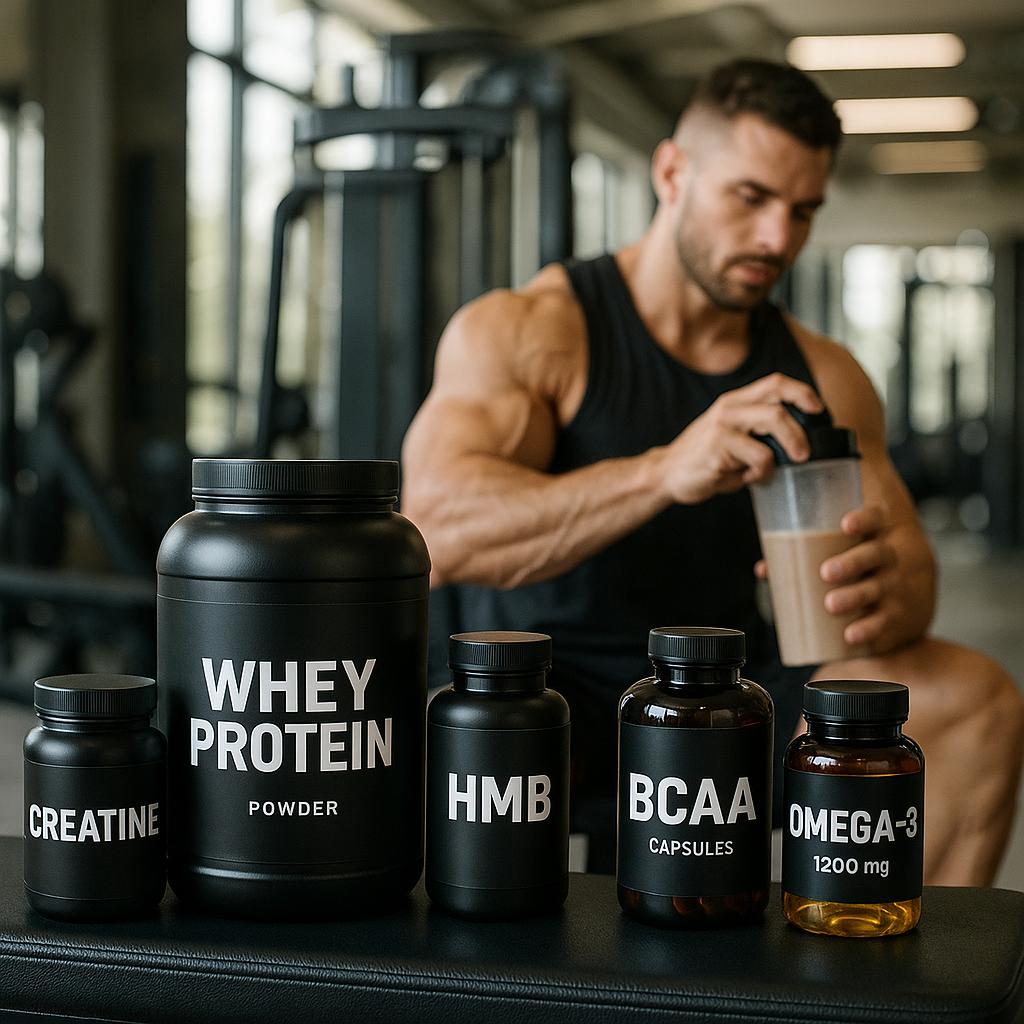
Understanding the facts about bodybuilding supplements helps you:
- Make faster progress with muscle gain and fat loss.
- Recover more efficiently after tough workouts.
- Save money by choosing only what’s truly effective and safe.
- Avoid potentially risky or adulterated products.
In this guide, you’ll find:
- Science-backed supplement recommendations for every bodybuilding goal.
- Up-to-date pricing, safety tips, and common questions.
- Key links to official resources and trainer advice.
Why Use Bodybuilding Supplements?
Bodybuilding supplements are used to enhance muscle growth, speed recovery, improve workout performance, and support overall body composition—especially when optimal nutrition is difficult to achieve through food alone.
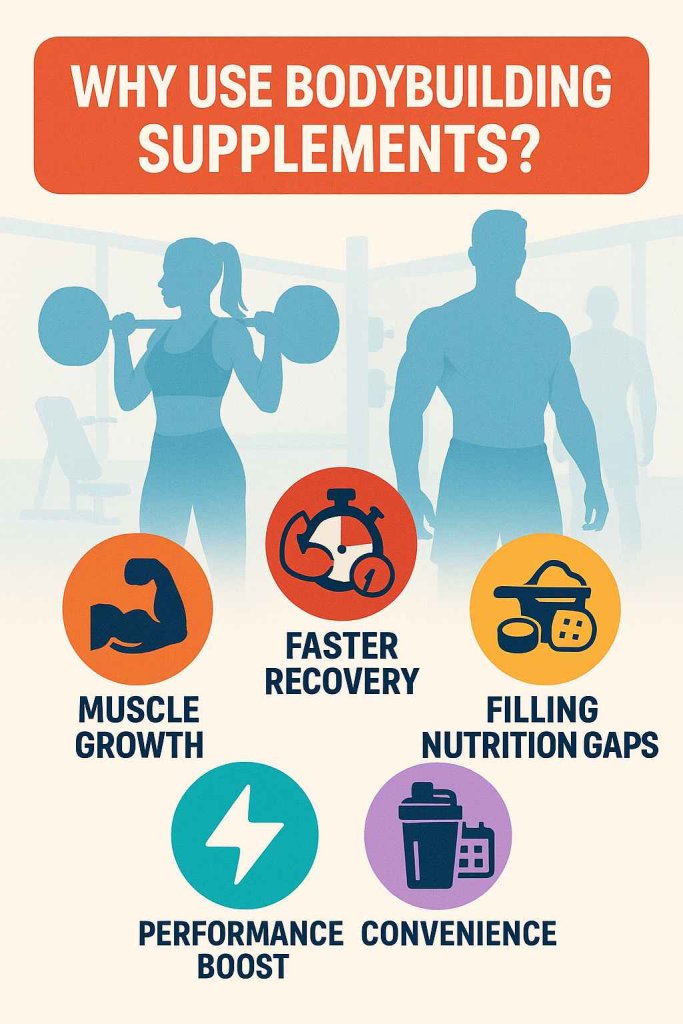
Scientific Reasons:
- Filling Nutritional Gaps:
Even with a balanced diet, many people struggle to consistently eat enough high-quality protein, amino acids, or micronutrients needed for optimal muscle repair and growth. Supplements like whey protein make it easy to reach scientifically recommended daily protein targets (1.6–2.2 g/kg body weight) for muscle gain and fat loss (Morton et al., 2018). - Proven Performance Benefits:
Certain supplements, especially creatine monohydrate, are extensively proven to increase strength, muscle mass, and high-intensity workout performance. Research shows creatine users typically gain 10–15% more strength and 2–5 lbs more muscle over 8–12 weeks compared to placebo (NIH, 2024). - Faster Recovery:
Supplements like protein, BCAAs, and HMB can reduce post-workout muscle soreness, speed up recovery, and preserve lean mass during dieting or intense training (Jäger et al., 2017). - Convenience and Consistency:
Powders, ready-to-drink shakes, and capsules make it easy to meet your body’s needs—especially for busy athletes, vegans, or those with appetite or digestive challenges. - Evidence-Based Safety:
Supplements such as creatine, whey protein, and HMB are considered safe and effective for healthy adults when used as directed (NIH, 2025).
Bodybuilding supplements help bridge nutrition gaps, accelerate muscle growth, and boost training results—backed by years of peer-reviewed research and expert consensus. For best results, use supplements to complement (not replace) a nutritious diet and consistent strength training.
What Are the Best Bodybuilding Supplements in 2025?
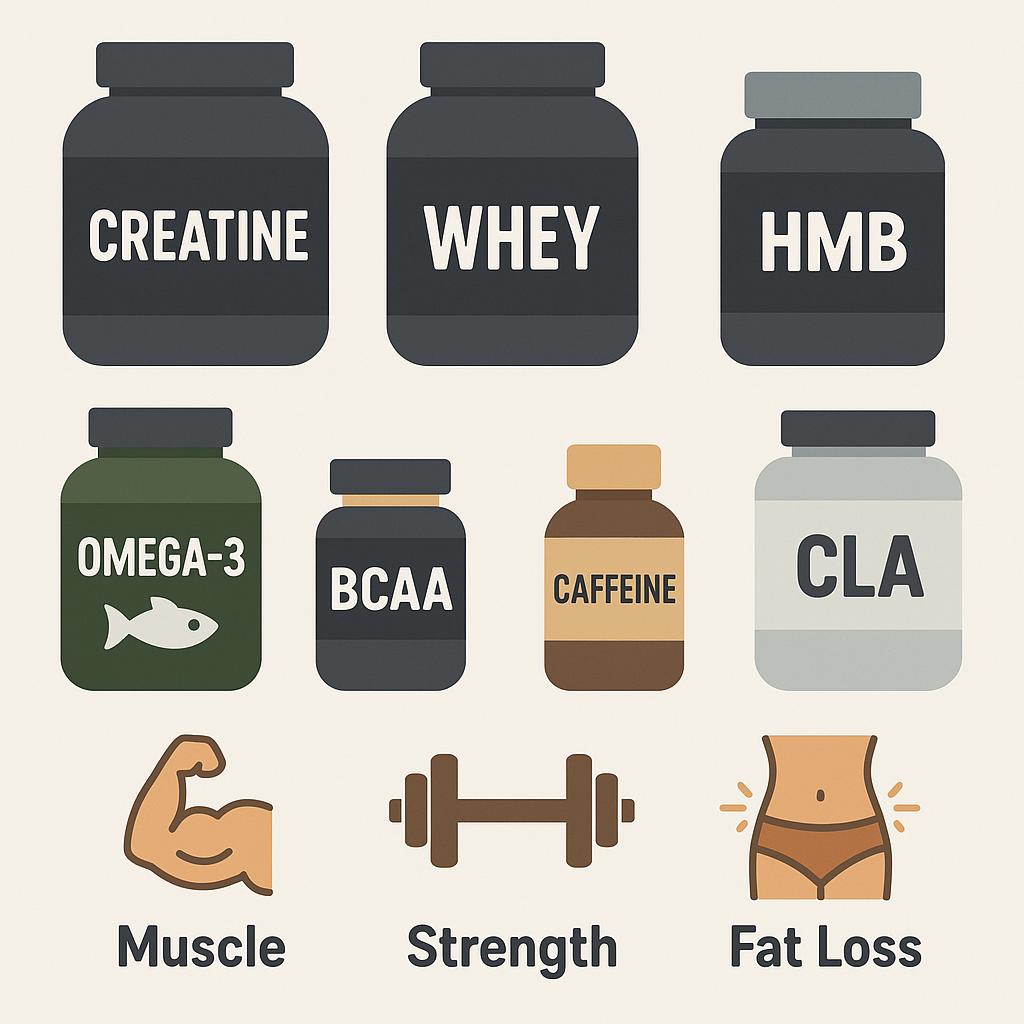
The most effective supplements for muscle mass, fat loss, and recovery—supported by both science and trainers—are:
1. Creatine Monohydrate: The Gold Standard for Muscle and Strength
Why Creatine Remains
Creatine monohydrate is still the most proven and widely recommended bodybuilding supplement. According to the International Society of Sports Nutrition (ISSN) and a recent 2024 research review, creatine helps users gain an average of 2–5 lbs of lean muscle over 8–12 weeks while boosting strength by 5–15%. (source, 2024)
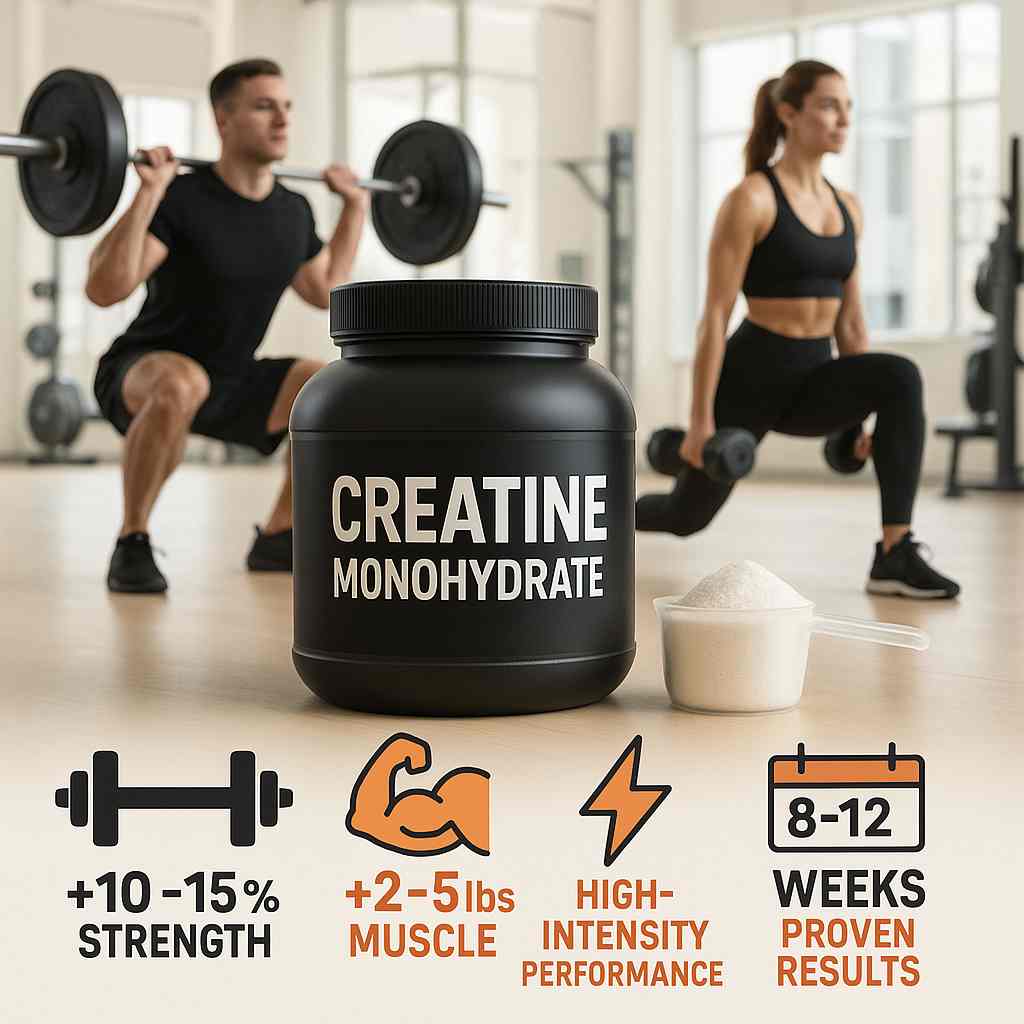
- How it works: Creatine increases muscle phosphocreatine stores, allowing for higher-intensity training and improved recovery. This leads to more reps, heavier lifts, and faster adaptation.
- Trainer’s Advice: Use “Creapure” or pharmaceutical-grade creatine for best purity. Safe for women and men; minimal side effects when used as directed.
- How to take: 3–5g daily, any time of day (loading phase not required). Mix with water or any beverage.
- Current price: $0.20–$0.60 per serving (July 2025).
Latest science: Recent studies confirm creatine also benefits cognitive function and fat loss (by increasing training volume). (Business Insider, 2025)
Recommended Creatine Monohydrate Products
Looking for a high-quality creatine supplement you can trust? Here are our top picks available on Amazon, chosen for their purity, brand reputation, and athlete-approved performance.
| Product Name | Key Feature/Benefit | Shop on Amazon |
|---|---|---|
| Nutricost Creatine Monohydrate | Pure micronized creatine for strength & muscle growth | Shop on Amazon |
| Onnit Creatine Monohydrate | Informed Sport certified, premium quality | Shop on Amazon |
2. Whey Protein: Fastest Recovery & Lean Muscle Builder
Why Whey Protein Works
Whey is a fast-digesting, complete protein—rich in essential amino acids and BCAAs. Numerous clinical trials confirm that adding whey to your diet increases muscle size, strength, and speeds up recovery.
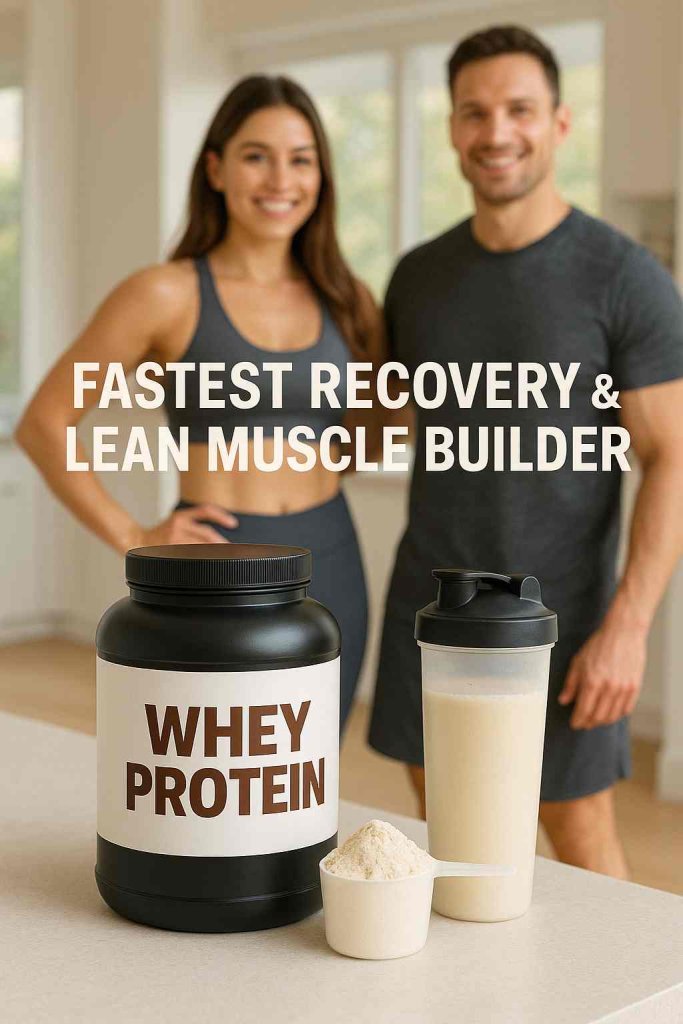
- Benefits: Convenient for reaching protein targets (1.6–2.2g/kg bodyweight). Promotes lean mass while supporting fat loss. Can replace a snack or post-workout meal.
- Trainer’s Advice: Choose whey isolate for lactose intolerance. Compare ingredient lists for additives and artificial flavors.
- How to take: 20–40g within 2 hours post-workout, or as a meal supplement.
- Current price: $1.00–$1.50 per serving (2025 average).
Science update: A 2023 meta-analysis found that high-protein diets with whey produce greater fat loss and preserve muscle during calorie deficits. (source)
Recommended Whey Protein Products
Looking for reliable whey to speed recovery and support lean muscle? These picks are widely trusted for purity, performance, and flavor.
| Product Name | Key Feature/Benefit | Shop on Amazon |
|---|---|---|
| Optimum Nutrition Gold Standard 100% Whey | 24 g blended whey; mixes easily; consistently top‑rated | Shop on Amazon |
| NAKED Nutrition Whey Protein | Minimal ingredients; no additives/sweeteners; Informed Choice | Shop on Amazon |
3. HMB (β-Hydroxy β-Methylbutyrate): Muscle Retention & Enhanced Recovery
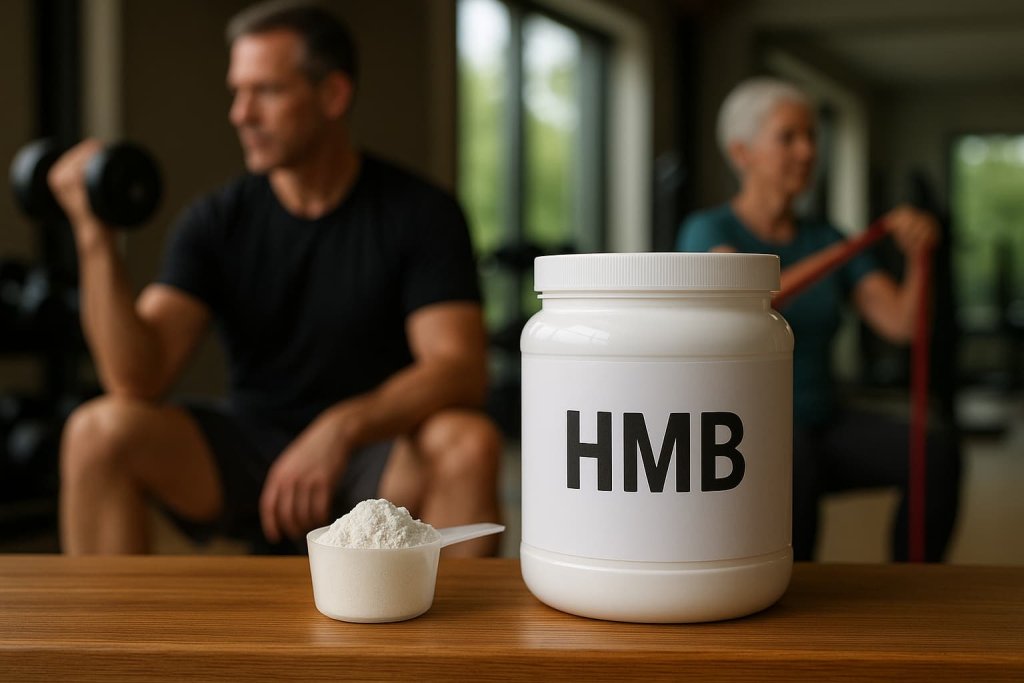
What Is HMB?
HMB is a natural metabolite of leucine, an amino acid crucial for muscle growth. It is especially valuable for beginners, those returning from layoffs, or anyone training intensely or dieting hard.
- Science-backed effects: Reduces muscle protein breakdown. Aids in recovery from intense or prolonged exercise. Minimizes muscle loss during calorie deficits.
- How to take: 3g daily, best split into two or three doses. Pre-workout dose (~1 hour before) is ideal.
- Who benefits most: Beginners or those under heavy training stress. Athletes in a cutting phase. Older adults combating age-related muscle loss.
- Price: $0.80–$1.20/serving.
Recommended HMB Supplements
If you’re looking to add HMB to your supplement stack, these options are highly rated for purity, effectiveness, and brand trust.
| Product Name | Key Feature/Benefit | Shop on Amazon |
|---|---|---|
| NutraBio HMB (1000 mg) | Clinically supported; supports strength, lean mass, and recovery; third-party tested | Shop on Amazon |
| NatureBell HMB (3000 mg) | Triple-strength formula; 99% purity; non-GMO & third-party lab tested | Shop on Amazon |
4. Omega-3 Fatty Acids: Fat Loss, Heart Health & Recovery
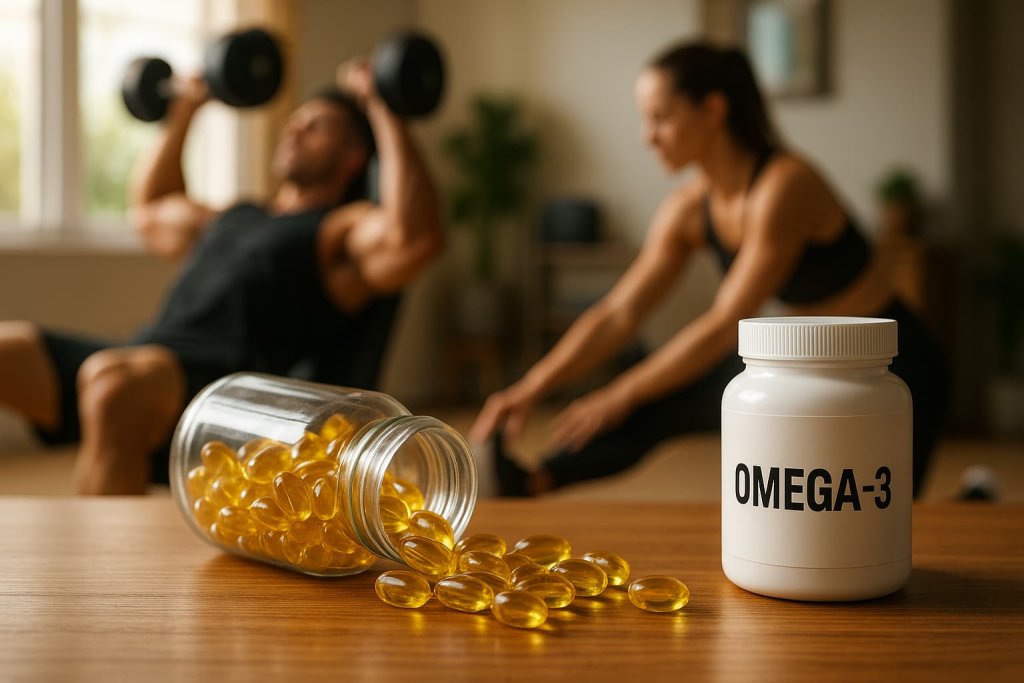
Why Omega-3s Matter for Bodybuilders
Omega-3s (EPA/DHA) support anti-inflammatory recovery, joint health, brain function, and may help with abdominal fat loss. In 2024, studies in overweight adults and athletes showed those supplementing omega-3 lost more body fat, especially when combined with resistance training.
- How to use: 1–3g total EPA/DHA per day (check label). Take with meals for best absorption.
- Trainer’s Note: Buy third-party tested fish oil (NSF, IFOS, or USP seal). Vegan? Choose algae-based EPA/DHA.
- Average cost: $0.50–$1.00/serving.
Recommended Omega-3 Supplements
For maximum recovery, heart health, and fat loss benefits, here are some top-rated omega-3 options available on Amazon—chosen for purity, potency, and third-party testing.
| Product Name | Key Feature/Benefit | Shop on Amazon |
|---|---|---|
| Nordic Naturals Ultimate Omega | High-dose EPA/DHA in triglyceride form; superior absorption; IFOS certified | Shop on Amazon |
| Sports Research Triple Strength Omega-3 Fish Oil | 3× strength per softgel; wild-caught; molecularly distilled; IFOS certified | Shop on Amazon |
5. Branched-Chain Amino Acids (BCAAs) & Essential Amino Acids (EAAs): Recovery for Hard Trainers
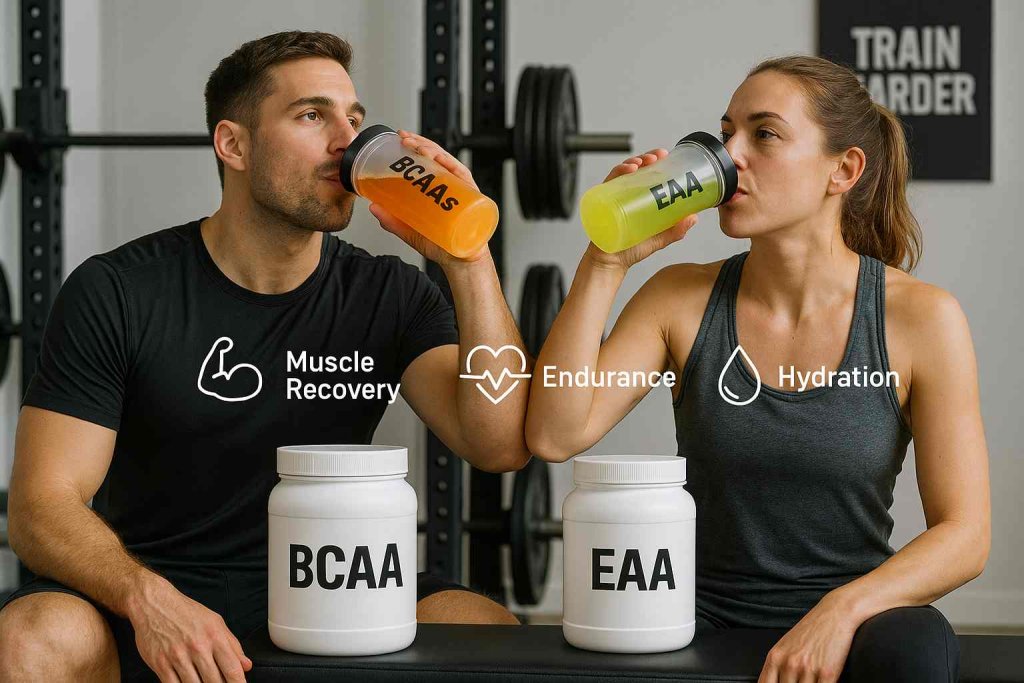
Who Needs BCAAs/EAAs?
If you train fasted, eat plant-based, or are dieting hard, BCAAs and EAAs help reduce muscle breakdown, preserve lean mass, and boost workout endurance (TIME, 2025).
- How to use: 5–10g before or during workouts, especially in a calorie deficit. Great for older adults and athletes doing endurance or multiple sessions per day.
- Cost: $0.60–$1.10/serving.
Recommended BCAA & EAA Supplements
These selections are chosen for their clinical backing, transparency, and post-workout effectiveness. Whether you want rapid recovery, value, or full spectrum amino support, these Amazon-available options stand out for quality athletes.
| Product Name | Key Feature/Benefit | Shop on Amazon |
|---|---|---|
| Nutricost BCAA Powder | Budget‑friendly; plain formula in 2:1:1 ratio; lab‑tested for purity | Shop on Amazon |
| Thorne Amino Complex | NSF Certified for Sport; includes all EAAs; trusted by professionals | Shop on Amazon |
6. Caffeine and Pre-Workout Supplements: Energy, Focus, and Fat Burning
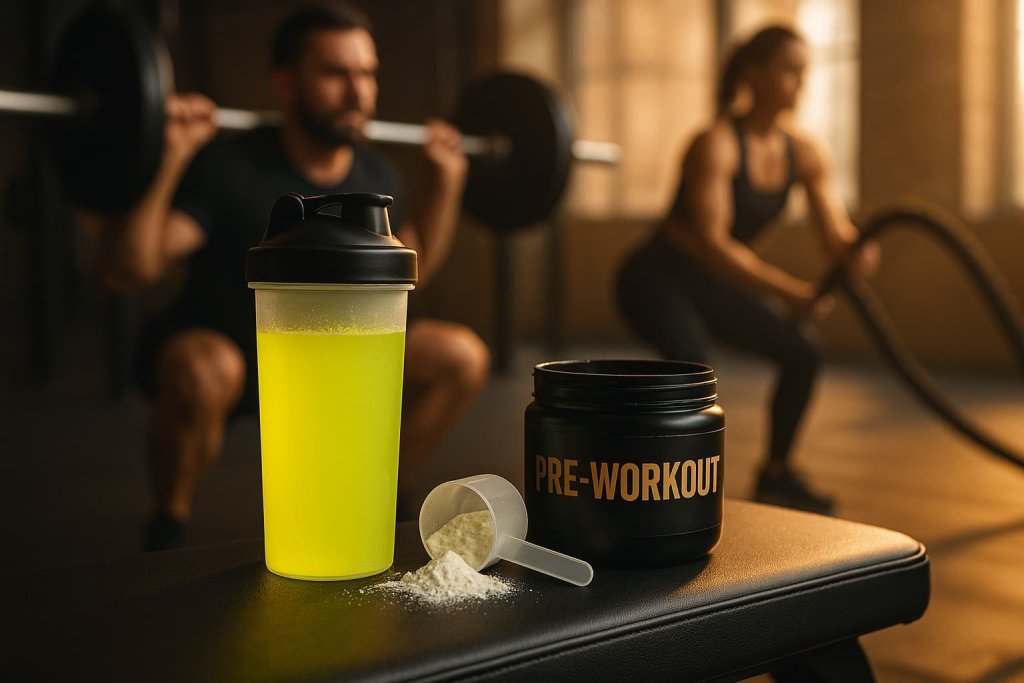
Why Use a Pre-Workout?
A quality pre-workout boosts energy, mental focus, and fat oxidation, helping you train harder. Most contain a mix of caffeine (150–300mg), beta-alanine, citrulline, and sometimes creatine (Business Insider, 2025).
- How to use: Take 150–300mg caffeine 30–45 min pre-workout. Do not exceed 400mg/day. Avoid late evening use (can disrupt sleep).
- Trainer’s Note: Cycle pre-workouts (e.g., 8 weeks on, 2 weeks off) to avoid tolerance. Always check for third-party certification and avoid banned stimulants.
Recommended Caffeine & Pre-Workout Supplements
For clean energy, sharp focus, and fat-burning support, these pre-workouts are top-rated on Amazon for ingredient quality, dosing transparency, and flavor.
| Product Name | Key Feature/Benefit | Shop on Amazon |
|---|---|---|
| Optimum Nutrition Gold Standard Pre-Workout | Caffeine, creatine, beta-alanine blend; supports energy, focus, endurance | Shop on Amazon |
| Cellucor C4 Original/Sport | Beginner-friendly, affordable, well-balanced pre-workout formula | Shop on Amazon |
7. L-Carnitine, CLA, Yohimbine: Targeted Fat Loss Tools
Do These Work?
- L-Carnitine: Helps fat metabolism and recovery; most effective in older adults or those with low dietary carnitine.
- CLA (Conjugated Linoleic Acid): 3.2g/day may offer mild fat-loss benefits, but results vary.
- Yohimbine: Proven to burn stubborn fat in lean, experienced athletes but should be used with medical guidance—possible side effects (anxiety, increased heart rate).
These are not “magic pills.” Use only after you have the basics (diet, training, sleep) optimized.
Recommended Fat-Loss Supplements
If your diet, training, and recovery are already in place, these targeted fat-loss tools are among the most trusted on Amazon—chosen for purity, potency, and transparent labeling.
| Product Name | Key Feature/Benefit | Shop on Amazon |
|---|---|---|
| Jarrow Formulas Acetyl-L-Carnitine | Vegan-friendly, third-party tested; supports energy and fat metabolism | Shop on Amazon |
| NOW Foods L-Carnitine 1000 mg | Pure Carnipure® formula; supports recovery and endurance | Shop on Amazon |
| Sports Research CLA 1250 mg | 95% CLA from safflower oil; non-GMO, soy-free; supports metabolism | Shop on Amazon |
| PrimaForce Yohimbine HCl 2.5 mg | Lab-tested potency; flexible dosing; for experienced users | Shop on Amazon |
Supplement Comparison Table
| Supplement | Main Benefit | Who Needs It | Typical Dose | 2025 Price (avg.) |
|---|---|---|---|---|
| Creatine | Muscle, strength | Everyone | 3–5g/day | $0.20–$0.60 |
| Whey Protein | Recovery, growth | Most lifters | 20–40g/post-WO | $1.00–$1.50 |
| HMB | Anti-breakdown | Beginners, dieters | 3g/day | $0.80–$1.20 |
| Omega-3 (EPA/DHA) | Fat loss, recovery | Most lifters | 1–3g/day | $0.50–$1.00 |
| BCAA/EAA | Muscle protection | Deficit/vegan/older | 5–10g/workout | $0.60–$1.10 |
| Caffeine/Pre-WO | Energy, fat loss | Most, unless sensitive | 150–300mg/pre | $0.50–$1.50 |
| L-Carnitine/CLA/Yohimbine | Fat loss | Advanced only | See label | $0.80–$1.50 |
How Trainers Build a Supplement Stack (Pro Recommendations)
Top trainers focus on:
- Creatine monohydrate for everyone wanting muscle and strength.
- Whey protein for recovery and hitting daily protein goals.
- Omega-3s and a basic multivitamin for general health.
- Caffeine (or pre-workouts) for extra energy, as needed.
- Add BCAAs/EAAs or HMB for hard dieters, older adults, or those with frequent soreness.
Always start with ONE new supplement at a time to monitor results and side effects.
Best Practices: How to Use Supplements for Results
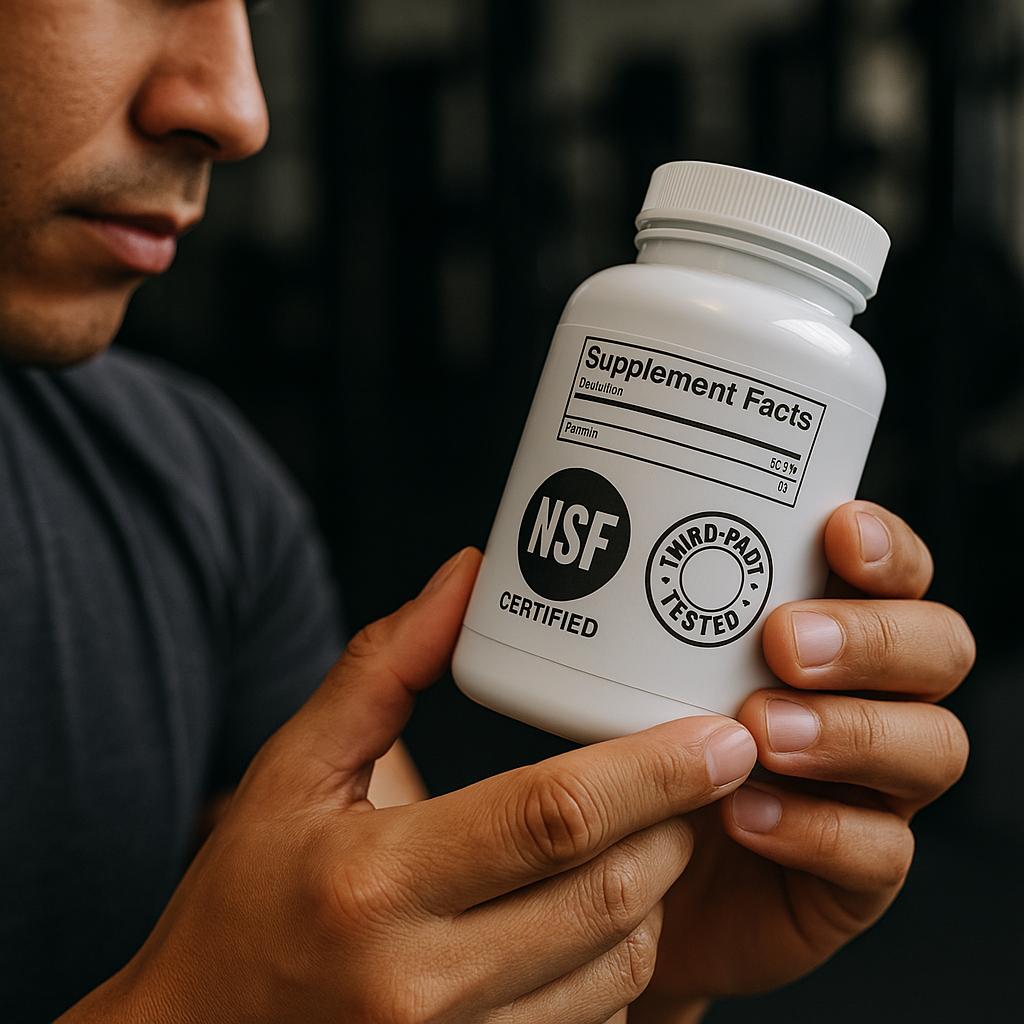
- Prioritize diet first: No supplement can fix a bad diet.
- Buy from reputable brands: Look for third-party testing—NSF, Informed Sport, USP, or ConsumerLab.
- Cycle caffeine-based supplements: Prevents tolerance and preserves effectiveness.
- Check labels for allergens and banned substances: Essential for competitive athletes.
- Track your results: Keep a log of how you feel, train, and recover on new products.
FDA & NSF Update:
As of July 2025, U.S. authorities strongly recommend avoiding unregulated brands due to rising contamination risks. Stick with certified suppliers and check batch numbers on official websites for recalls.
Frequently Asked Questions
Q: Do I really need supplements to see results?
A: Not always! Training hard, eating well, and sleeping enough create 90% of your results. Supplements help fill gaps and speed progress—especially when used smartly.
Q: Are these supplements safe for women?
A: Yes, most (including creatine, whey, omega-3s, and BCAAs) are safe for both men and women. Always follow label directions.
Q: What if I’m plant-based?
A: Look for vegan protein powders, plant-based BCAAs, and algae-based omega-3s. Creatine is always vegan.
Q: Can supplements replace real food?
A: Never! Think of them as “insurance”—not as meal replacements.
Q: What should I try first?
A: For muscle: creatine and whey protein. For fat loss: omega-3s, plus a caffeine-based pre-workout (if not sensitive).
Real-World Example: 2025 Supplement Stack
Beginner:
- Creatine monohydrate (3–5g daily)
- Whey protein (20–30g post-workout)
- Omega-3 (1g daily)
Intermediate/Advanced (cutting phase):
- All above, plus HMB (3g/day), BCAAs (5–10g intra-workout)
- Caffeine pre-workout (150–200mg before training)
Conclusion
If you want to maximize muscle growth and fat loss, creatine and whey protein are the absolute must-haves for 2025—science and trainers agree. HMB, omega-3s, BCAAs, and targeted fat-loss aids can further accelerate your progress.
- Start with the basics: Diet, sleep, and training first.
- Add supplements as “boosters”—not crutches.
- Always choose third-party certified products.
Ready to start?
- Review your current routine and goals.
- Select ONE or TWO core supplements based on your needs.
- Shop certified brands and check official policy pages for the latest safety info.
- Track your results and adjust as you go.
Want help building your custom stack? Consult a registered dietitian or certified trainer here.
